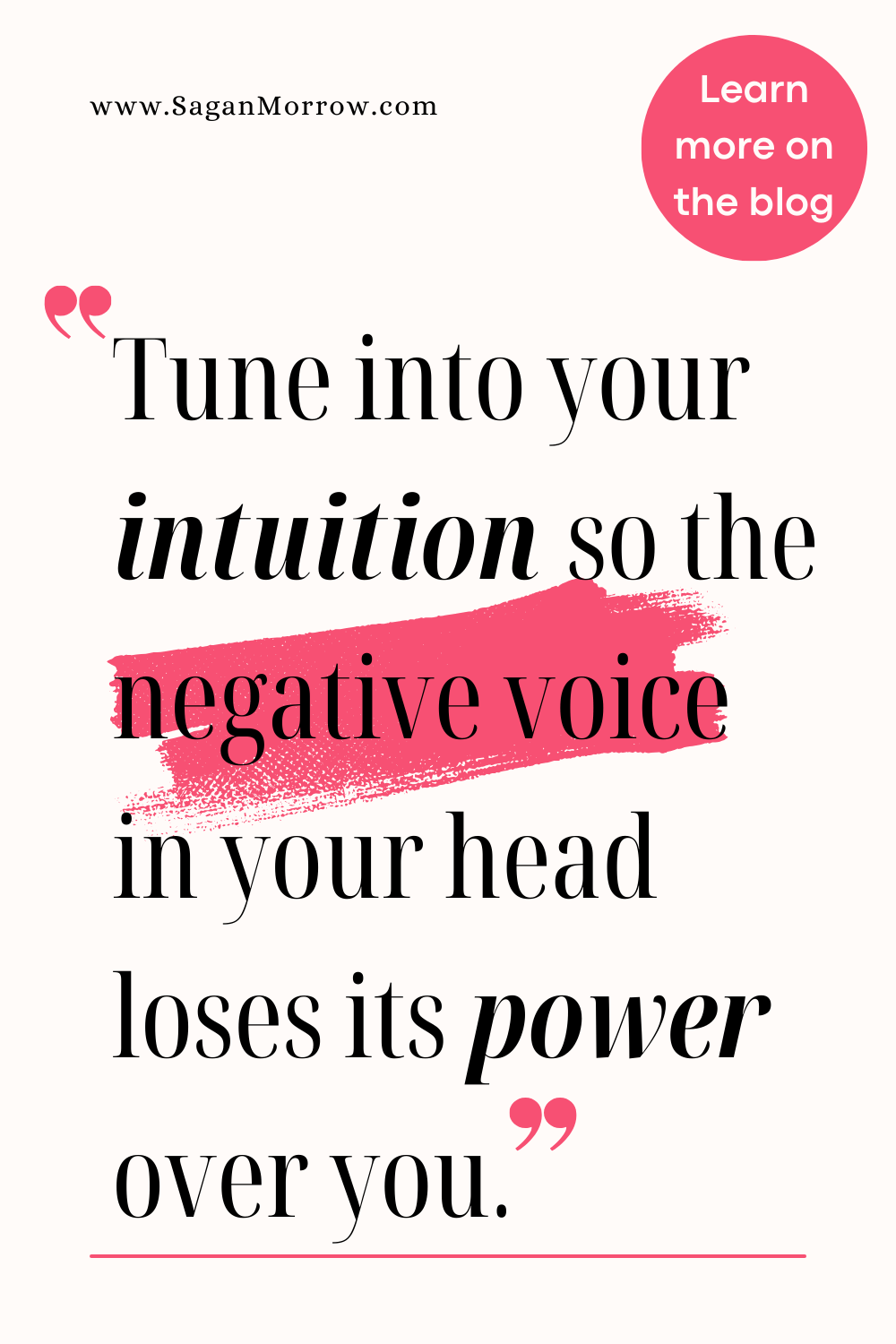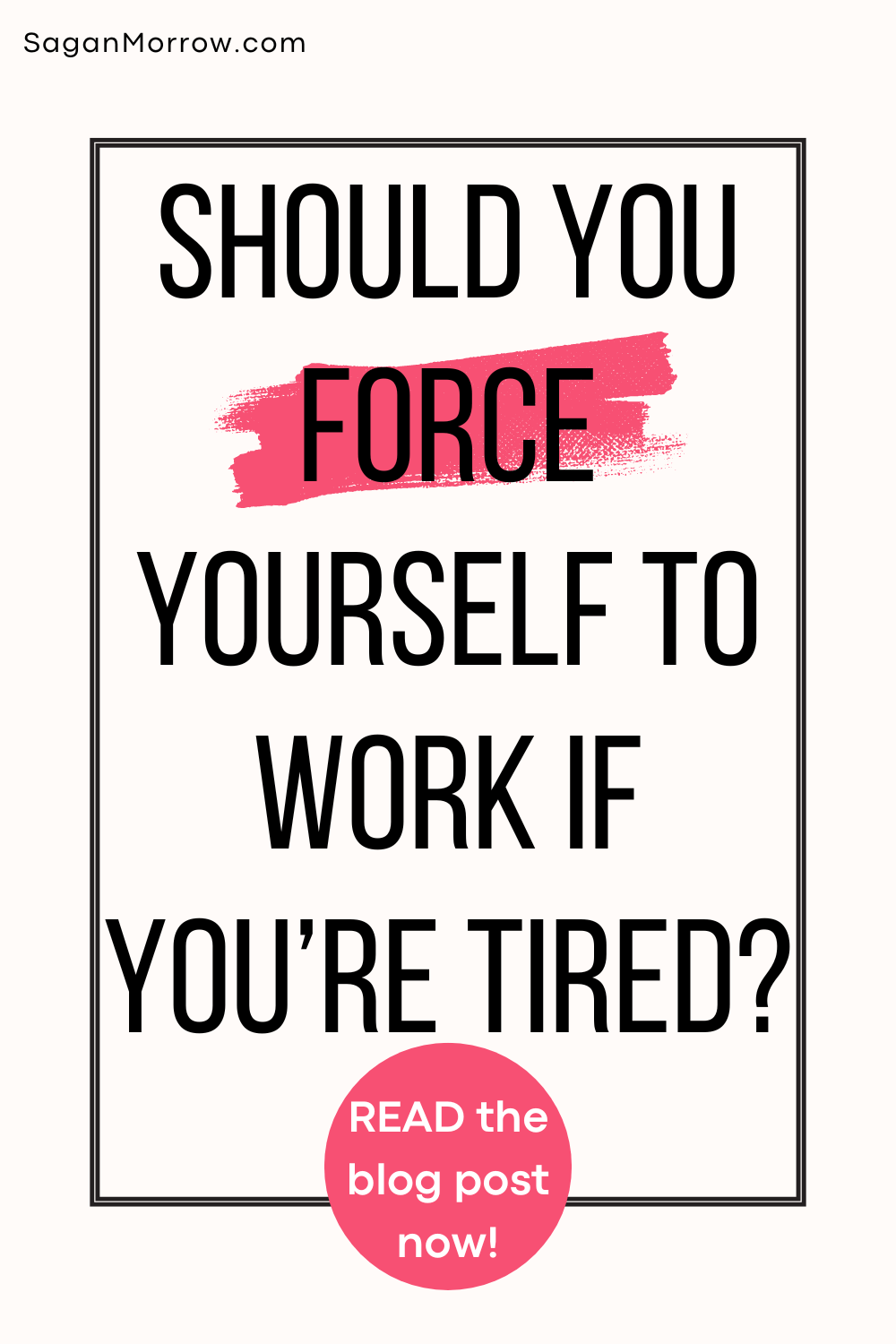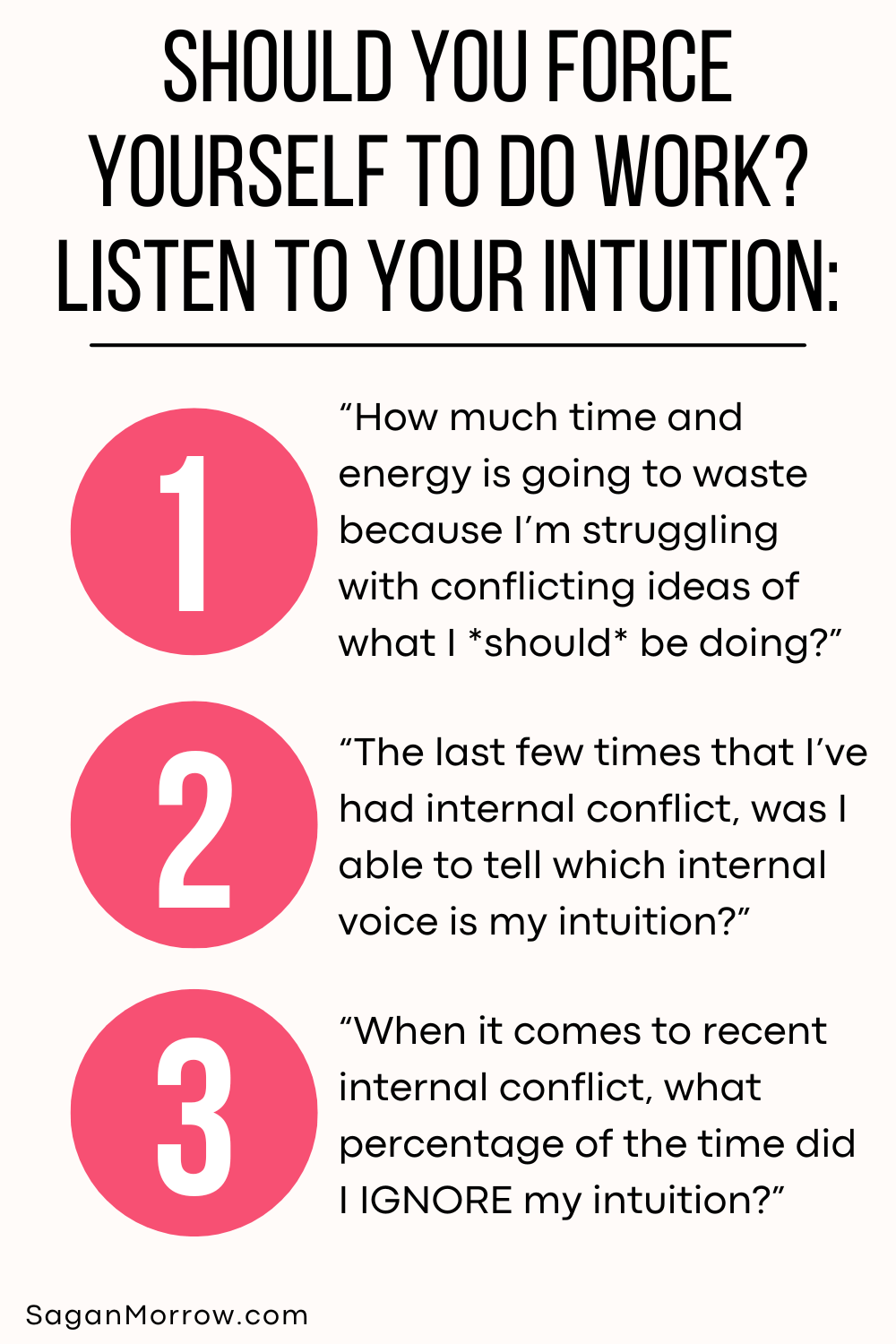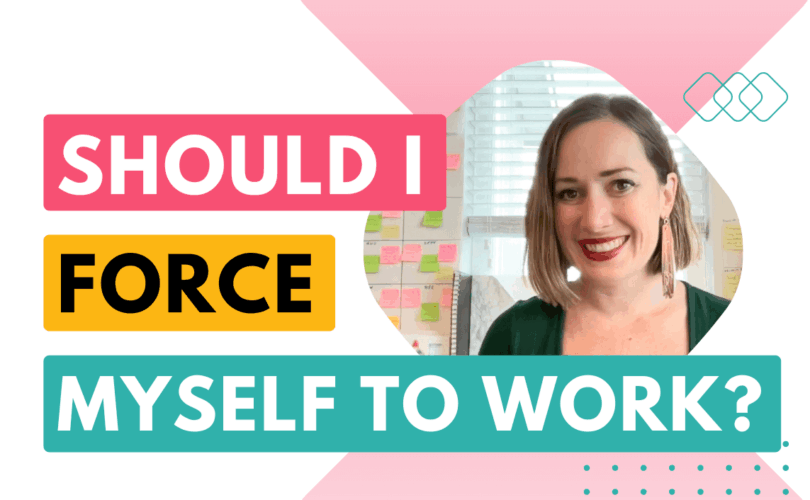“Should I keep working if I’m tired?” As an anti-hustle productivity strategist and cozy business owner, I hear this type of thing from my clients a lot! SHOULD you power through tasks — and should you force yourself to do work when you’re struggling and in need of a break?
This actually comes down to listening to your intuition, and learning how to differentiate between intuition and negative thoughts! Let’s dive in…
Topics we address in this article...
- Should you power through tasks when you're tired?
- How to know the answer to "Should I keep working if I'm tired?"
- 6 indicators you should NOT keep working.
- When SHOULD you "force" yourself to work?
- 5 indicators you SHOULD power through and complete those tasks.
- The importance of listening to your intuition.
- 3 questions to explore as your differentiate your INTUITION from your NEGATIVE THOUGHTS.
A condensed version of this article originally appeared as the March 2, 2024 edition of the Solopreneur Diary Entries newsletter.
Should you power through tasks when you’re tired?
I WANT to get outside for a nice long walk — and I know my mental state could benefit from it…
But my to-do list has a lot on it!
I should probably power through my tasks instead of taking a break.
As much as I live and breathe anti-hustle methods, thoughts like the above still manage to creep their way into my head!
In fact… This exact thought came up for me earlier this week.
…And as soon as it did, I knew that “powering through tasks” was the LAST thing I should do.
So I stepped away from the computer, grabbed my jacket, and walked out the door.
Ninety minutes later I returned to my work feeling replenished and refreshed. And guess what? That task list didn’t seem so daunting anymore.
(And I came up with some awesome, fresh new ideas during my walk — which is what always happens!)
How to know the answer to “Should I keep working if I’m tired?”
This depends on a range of factors, however you can get a good sense of whether it’s a better idea to power through tasks vs take a break when you pay attention to certain useful signs…

Here are some indicators that you should NOT power through tasks:
- Your brain feels fuzzy and you’re working at a much more lethargic pace than usual; you can FEEL yourself powering down.
- It’s a struggle to drag yourself to the computer; you have zero interest in doing the work.
- Your creativity is sapped — you can’t think of new ideas and everything feels like a huge amount of effort (not in a good way where you’re challenging yourself, but in a burnout sort of way).
- You aren’t getting anywhere with your work. Your progress has stalled, and you don’t really have much to show for what you’ve been “working on” for the past hour.
- The work you’re doing isn’t at your usual high quality. To be honest, there’s a good chance you’ll either be disappointed in yourself later on when you look back on this work, or you’ll need to redo it.
- You really WANT to take a break!
Find out what to do when you simply CAN'T power through work in the Powering Through Work vs Powering Down as a Solo Entrepeneur article.
When SHOULD you power through tasks and force yourself to do work?
First of all, if you often feel like you need to force yourself to do work, that’s likely an indication of deeper issues you need to work through.
For example:
- The tasks themselves might not be the right fit for you.
- The goals you’ve set might not be the right fit for you.
- The strategy and approach you’re taking, or the methods you’re using, might not be the right fit for you.
- You might need to work on your time management and energy management skills.
…There could be MANY different reasons why you feel like you should power through tasks and force yourself to do work!
Learn more about this in my Anti Hustle Productivity for Solopreneurs training:
That being said, there may be some instances in which you should power through tasks!
Here are some indicators that you SHOULD power through tasks:
- You're in a creative flow with good momentum; even though you might be tired, you still have ideas flooding in.
- You really WANT to continue going, and you know that you can take extra time off tomorrow to get plenty of rest and recuperate.
- You’ve got a deadline to meet — and you know that you have the ability to push yourself a little further to stick to that deadline, without exhausting yourself.
- It’s a “good” kind of tired, where you feel fulfilled and deeply satisfied with the work you’re doing (and you have just a little bit more to go before you step away from your work).
- You’re still producing work at a high-quality level (the quality hasn’t suffered), and your usual pace of working hasn’t been affected by your tiredness yet.
See the difference between this, vs what we explored above with the reasons why you should NOT force yourself to do work?

Listening to your intuition
Not only is this a good example of leaning into energy management and anti-hustle methods, but it’s a good example of the value in listening to your intuition: Listening to yourself when your inner voice says you need to take a break.
I’m going to go out on a limb here and guess that you sometimes — perhaps often? — experience an internal struggle: Two different voices inside you, telling you to do different things.
That’s your intuition vs negative thoughts speaking to you.
Those voices can be at odds in virtually ANYTHING, but in this instance it is: “Take a break!” vs. “Push harder and keep working!”
The issue becomes when you can’t differentiate between your intuition and negative thoughts; between those two voices:
Which one is the “right” one?
Which one “should” you listen to at this moment?
What we explored above, with those indicators of when you might want to power through tasks vs take a break from work, are a really good example of starting to learn how to differentiate between those conflicting voices in your head and beginning to listen to the true voice, at your core — your intuition.
Learning how to differentiate between intuition and negative thoughts is a powerful skill to cultivate!
There are several approaches to differentiating your intuition from negative thoughts:
- Thought exercises to help you activate your intuition through decision-making.
- Reframing the negative voice in your head.
- Recognizing external validation and the influence of others in your choices.
- Making use of learning vs planning vs doing to make progress on your goals.
- The balance of critique and celebration in conjunction with fully expressing yourself.
- Thought experiments for how to change mindset and behaviour simultaneously.
- …and more.
There are many different ways we can go about differentiating between your intuition and negative thoughts, so that you can truly activate your intuition and much more easily begin listening to your intuition on an ongoing basis, automatically.
Get thought exercises for how to differentiate between intuition and negative thoughts, plus exactly what you need to do to make listening to your intuition 10x easier, in my Intuition Activated advanced masterclass:
This is also about improving your relationship with yourself: When you cultivate a good relationship with yourself, and when you develop your intuition muscle, you can much more easily differentiate between those two voices of your intuition vs negative thoughts — and in doing so, you’ll be able to FOLLOW your intuition.
Your intuition becomes clearer, louder, more powerful, more present.
…and as a result? Your internal conflict, all of that inner struggle you’re wrestling with, melts away.
When you tune into your intuition, the other voice within you — the negative thoughts — loses its power. You might still hear it, but you also recognize it for EXACTLY what it is, and it has zero control over you.
And because of THAT, you can *do the right thing for you* at that particular moment in time, with ease and expansion. There’s so much beauty in this!
Some questions for you to ask yourself as you learn how to differentiate between intuition and negative thoughts, and as you start listening to your intuition:
- How much time and energy is going to waste because I’m struggling with conflicting ideas of what I “should” be doing?
- The last few times that I’ve had an internal conflict, was I able to tell which voice is my intuition? Can I easily differentiate between them?
- When it comes to recent internal conflict, what percentage of the time did I IGNORE my intuition?
See what comes up for you when you ponder those questions!
...And if you aren’t able to come up with concrete answers to those 3 questions, or you are beginning to see that you’re neglecting your intuition, then I’d like to invite you to join me at the Activating Your Intuition masterclass.
It’s available on-demand (and it’s free!) to help you strengthen your intuition muscle:
As a Life Coach for Solopreneurs, I specialize in creating anti-hustle productivity strategies, developing intrapersonal skills, and improving personal fulfillment in your business AND life!
That masterclass is a great way to get a taste for my coaching style and integrate practical tips and ideas for strengthening your intuitive muscle.
Did you enjoy this article?
A condensed version of it originally appeared as the March 2, 2024 edition of the Solopreneur Diary Entries weekly newsletter.
Subscribe to the email list to get articles like this delivered directly to your inbox!

